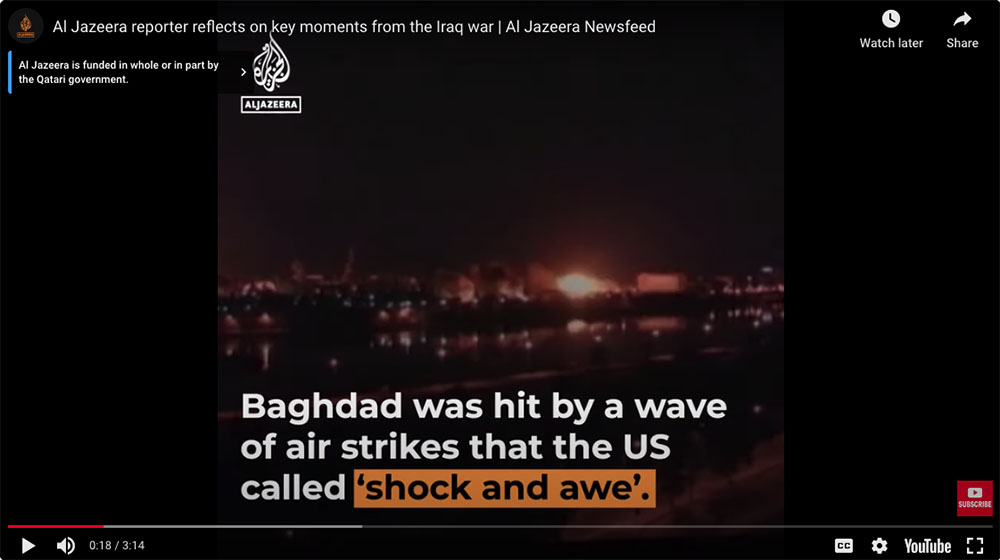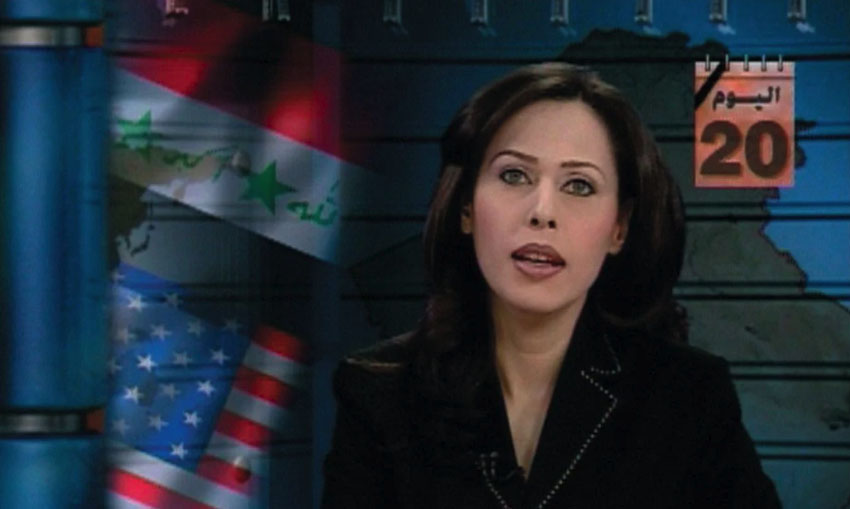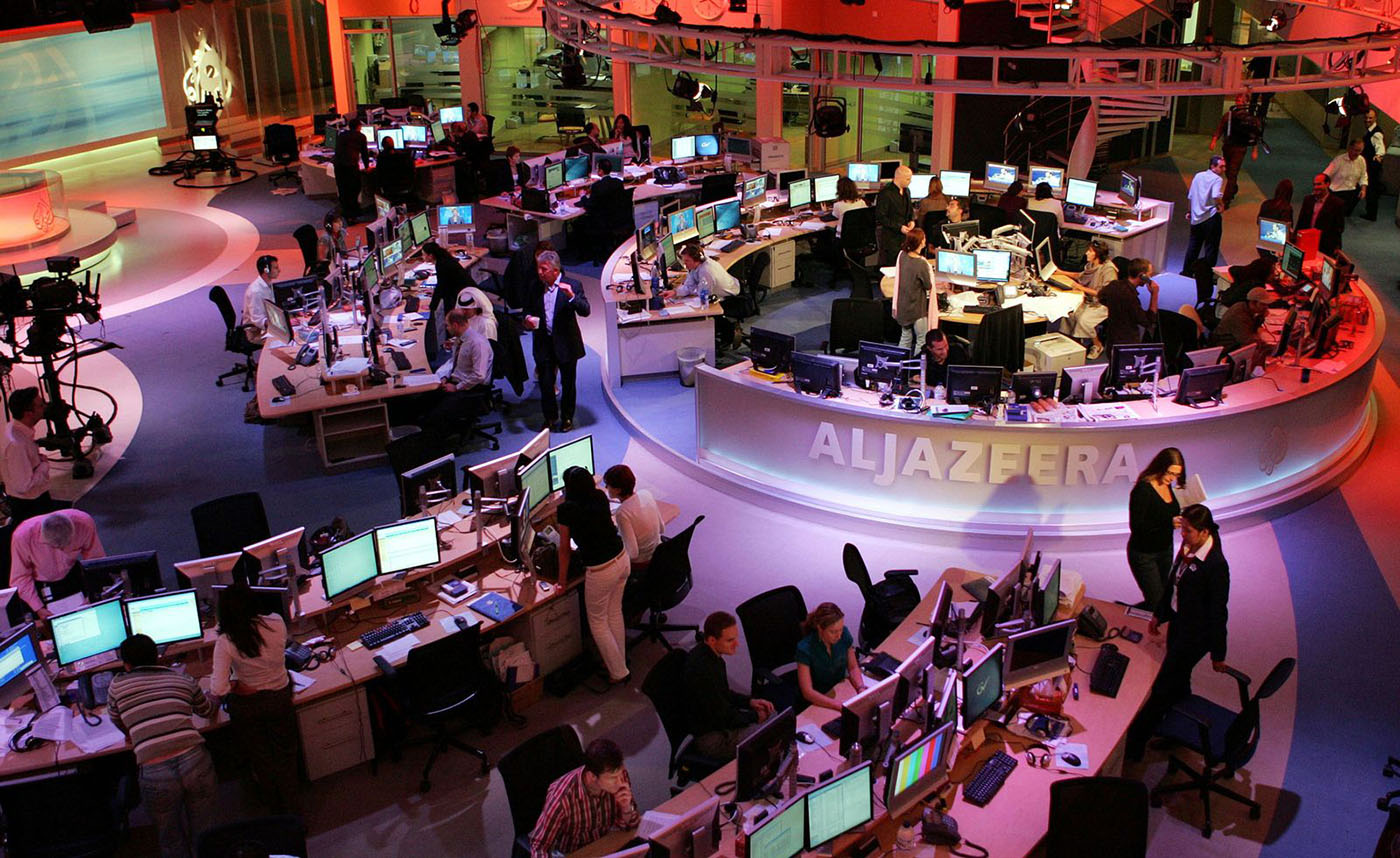How the Arab world’s most famous product went from boisterous matchbox to counter-hegemon with an establishment role.
Iason Athanasiadis
ATHENS: It seemed like a good idea to go work for Al Jazeera during the US invasion of Iraq.
In January 2003, we were just weeks away from another unpopular but era-defining American war. The last time the Americans rolled into Iraq, it was 1991 and their first hurrah since the Soviet Union’s collapse reportedly brought about the End of History. CNN was that war’s media revelation, using satellite for the first time to provide live coverage of the American army’s technological prowess. Fast-forward to 2003, and Al Jazeera now promised to offer a real-time anti-hegemonic narrative from an Arab perspective.
I replied to an ad in the Guardian and, a few weeks later, moved to Qatar to experience history from within.
Globally, millions were demonstrating against Iraq’s imminent invasion in what some claimed were the largest anti-war protests in history. But these failed to stop the invasion. Knowing the die was cast, Al Jazeera management raced against the clock to put in place a news website offering an alternative narrative to English-language readers during the conflict.
In the rush to get things ready, staff selection was slapdash. By the time we gathered in the website’s newsroom (shared with the staff of Al Jazeera Arabic), we must have made a strange sight. The overall chief was a Qatari former fighter-jet pilot; the managing editor a Cambridge University graduate with a Lebanese mother and American pilot father; her deputy a Lebanese physicist from upstate New York without exposure to journalism; and we journalists a quixotic mix of diaspora Arabs, British Muslims, some Indian print journalists, and a token American who had grown up in Qatar. Later on, a British journalist who converted to Islam after a Road to Damascus moment following her kidnapping by the Taliban also joined. Much of the international media was in Doha waiting for the war to start, and in an effort to defuse the Western media narrative over Al Jazeera, the managing editor would give several interviews every day while we worked away preparing material for going live, even as hackers directed attacks against the website.

BEGINNINGS
We were already part of an Al Jazeera tradition of dissent, one going back to the channel’s 1996 founding. Saudi Arabia had banished BBC Arabic from its Orbit satellite for screening a series of interviews with Saudi opposition figures. The BBC subsequently withdrew funding from its Arabic service (it was the End of History, after all, and information operations were no longer as necessary), leaving a large pool of trained Arab journalists in search of employment. That was when Sheikh Hamad bin Thamer, a pan-Arabist-minded relative of the Qatari Emir, suggested Qatar invite these journalists to Doha to set up the Arab world’s first 24-hour news station. It was the same year as the construction of the then-secret US base at al-Udeid, marking two corners of the triangle defining Qatari foreign policy over the next three decades: the third would be Doha’s support for Sunni Islamist groups.
“Al Jazeera at its start was doing — in a clumsy way — what the Emir wanted them to do: to be a revolutionary voice in the Arab World,” said a retired US ambassador to Qatar who closely follows the channel. Like most of the other interviewees for this piece, this person requested anonymity in order to speak freely.
“As a certain generation of radical intellectuals on the left, we were desperate for a medium like Al Jazeera to come along,” said a Palestinian former staff member, “and when it did, we ignored some fundamental considerations, like the funding.”
“Al Jazeera was very courageous in conflicts in Afghanistan, Lebanon, and Palestine, and had incredible access to fighters,” said an American former employee at the channel. “Maybe the way in which this access was earned turned out to be problematic, but they could take us to places nobody else could.”
Initially, the Qataris omitted to recruit management along with the journalists. What followed was a case of “the inmates running the asylum,” in the words of the former US diplomat. Even after 9/11 and the invasions of Afghanistan and Iraq shifted the news agenda away from covering Palestine, Al Jazeera’s staff of mostly leftists, Islamists, and Arab nationalists “didn’t feel as if Al Jazeera was infiltrated yet,” in the words of the Palestinian journalist.
“I remember the anger, the rage, strong feelings unifying the people involved in Al Jazeera,” he said.
The American former diplomat attended the channel’s inauguration in 1998 and, after listening to a series of speeches pledging to build a free medium, wrote a cable to the State Department predicting that “there’s no way this regime is going to provide free and uncensored media.”
As an afterthought, he added that “if I’m wrong, this is going to be the biggest headache for my successors.”

A HEADACHE
And headache it became. Fifteen years later, the US would first threaten and then bomb Al Jazeera’s offices in Kabul, Afghanistan and Baghdad, Iraq, before engaging it in a rapprochement that moderated its news agenda. Along the way, Al Jazeera journalists were deported or banned by several countries from reporting, sentenced by Spanish and Egyptian courts to several years of imprisonment, killed in civil wars, shot by the Israeli military, and bombed by the US. Like Julian Assange and Wikileaks, the powerful made an example of them to discourage others from presenting awkward narratives.
“Al Jazeera chose from the beginning to be the ‘voice of the voiceless,’ wrote former managing editor Waddah Khanfar. “The channel built a strong bastion to separate its newsroom from the influence of the lobbies of palaces.”
Al Jazeera’s explicit round-the-clock coverage of the Israeli-Palestinian conflict (cf. Shireen Abu Akleh), its reporting on regime and state corruption, and its explosive talk shows that set representatives of different ethnicities, sects, and ideologies against each other shattered all Arab world limits. After decades of a regionwide pretense that Israel was an illegitimate entity whose representatives did not deserve coverage, the channel eased Israeli spokespersons into living rooms in Damascus, Khartoum, and Sanaa by regularly interviewing them. On a visit to the channel’s then-humble facilities in Doha, the Egyptian dictator who was to be removed by his people in 2011 wondered aloud at “all this noise coming out of this matchbox.”
“It was revolutionary, gripping, and often exhilarating,” said Naji Adeeb, a Syrian retired businessman who believes that the channel has gone downhill. “Nothing like it had been seen in the Arab world: saying the unsayable and discussing the hitherto undiscussable.”
“Me and my colleagues were wondering why the Arab world hadn’t exploded yet, given that it was horribly governed,” said the former US diplomat. “This was a room full of gunpowder and then somebody finally lit a match.”
The Emir of Qatar had come to power through a revolution of sorts that saw him replace his conservative father. His strategy to modernize involved hosting regional dissidents, intellectuals, and activists at up to 80 state-sponsored conferences a year. “You would think that Doha existed just for the conferences, a city in the middle of the desert hosting a whirlwind of them,” said the Palestinian former journalist. Usually invited to Doha by the Arab Center for Research and Foreign Policy Studies, run by Palestinian intellectual and royal adviser Azmi Bishara, guests argued, networked, and had their voices amplified by Al Jazeera talk shows.
“Al Jazeera gave the Arab viewer this illusion of watching ‘free’ news and talk shows,” said Yamen Sabour, a Canada-based writer and analyst and co-founder of Arabic-language news site Awan Media. “However, the talk shows and commentary were always calculated and produced in accordance with Qatar’s policies as, for example, the normalization of seeing Israeli officials on an Arabic screen under the guise of giving a chance to hear the ‘other opinion and voice.’”
Ironically, newsreader Jamil Azar, who invented Al Jazeera’s signature slogan and was one of its founders, departed the channel in 2011, complaining of a lack of balance in coverage of the Syrian civil war as too pro-rebel.
QATARI RED LINES AND AMERICAN INFLUENCE
“We quickly got off to a really bad start,” said the former US diplomat. “American ambassadors around the region began getting attacked by their host foreign ministries, demanding that the US do something about Al Jazeera.”
Αfter a Kuwaiti royal stormed out of an interview, causing regionwide controversy, the US State Department ordered its man in Doha to tell the Qataris to shut down the channel.
“On your last tour, you can be a little bit more suicidal,” he said, “so I sat on it for a day and then replied that I’ve just received a message instructing me to go tell an allied country to shut down the only piece of uncensored media in the region; I’m sure that this wasn’t meant for the American ambassador.”
The State Department did not reply.
Al Jazeera’s challenging of regional rulers and negative highlighting of American foreign policy did not transgress domestic red lines. These involved not reporting on internal issues sensitive to Qatar, such as its unacknowledged relations with Israel and its hosting of the largest US military base in the region. Simultaneously, Qatar maintained ties with Iran but also funded extremist Sunni Islamist groups such as al-Qaeda in Afghanistan and Chechnya. (The Consortium Against Terrorist Finance reported that a Qatar charity channeled funds to Chechnya-based al-Qaeda operatives in 1999, as well as to Ansar Dine in North Mali). In the 2010s, Doha hosted the leaderships of Hamas and a Taliban embassy. Backed by some of the world’s largest financial reserves, the emirate was performing an extraordinary balancing act.
Shortly after leaving in May 2003, I learned that a team from the US Embassy was about to carry out an audit of the organization. Relations were at an all-time low, following the US bombing of the Al Jazeera bureau in Baghdad (which killed correspondent Tareq Ayoub) and Deputy Defense Secretary Paul Wolfowitz’s proposal that the channel’s Doha headquarters also be bombed. This was rejected on the grounds that the US military base was only five miles away.
“The auditing team was shown nothing,” someone with knowledge of the audit told me, and there was a “personally hostile reaction from most of the people they talked with.”
But within a few years, US embassy cables leaked by Wikileaks revealed a transformed relationship: station chief Waddah Khanfar promised his American interlocutors to remove website material they found objectionable while fretting over US Defense Intelligence Agency documents relating to the channel’s coverage being left floating around the Al Jazeera office fax machines. Eventually, his stewardship of the channel became so controversial that he was replaced by a Qatari royal, although he claimed to the end to have left of his own volition so as not to become like the dictators Al Jazeera regularly criticized.
“This is a guy from Jenin in the West Bank, operating in a place like Doha with the largest American military camp down the road,” said a former staff member who witnessed the pressure he was put under by the Qatari government. “It was a terrifying prospect and to push back in the way that he did was quite courageous.”
“We used to show horrible scenes of the dead and the terribly wounded, of horrendous massacres,” said Ahmed Sheikh, a former Al Jazeera Editor-in-Chief. “Now that’s out.”
“There was a switch when Khanfar — who had done his best to keep them at bay — left,” said the Palestinian journalist of US influence. “The Qatari government got more directly involved, to tame things.”
“By 2005, Al Jazeera had got the editorial stuff under control,” the former US diplomat confirmed.

EDITORIAL LINES AND SOCIAL MEDIA
As it matured, the channel established a planning department and shifted from reacting to the news to being more anticipatory. It also provided more in-depth coverage, set guidelines on how to report, and overcame its ban in several Arab countries by integrating into its newsgathering social media and user-generated videos. This allowed ongoing coverage news coverage that was illustrated by user-generated media in the absence of ground correspondents.
“Traditional media need social media to get information,” said Sheikh, “and social media need traditional media to widen their scope of coverage.”
The culture clash between Al Jazeera correspondents and the American military during the 2003 US invasion of Iraq is captured sensitively by Jehan Noujaim’s documentary Control Room. In 2006, Al Jazeera English was launched. The difference in editorial line from its Arabic sibling was clear from the start and reflected its targeting of a separate audience. But the absence of emotive language and lack of editorial focus on Palestine, Iraq, and Afghanistan was also disappointing for those tuning in with the understanding that they would be watching an English-language version of the Arabic channel.
The Arab Spring was perhaps the station’s greatest turning point. As a number of calcified regional dictators were overthrown, Al Jazeera cheer-led their fall — at least those outside the Gulf.
Selective coverage saw revolutionaries and rebels in Egypt, Libya, and Syria receiving 24-hour positive coverage while Gulf Cooperation Council members repressing mostly peaceful protests in Yemen and especially Bahrain remained under-reported. An Al Jazeera English documentary from the Bahraini protesters’ perspective provoked diplomatic tensions between Bahrain and Qatar, but also upset Doha’s giant Saudi neighbor, from under whose shadow the emirate has always sought to break free.
“The great divide came with the so-called Arab Spring,” said Sabour, “where the channel soon revealed itself as merely the mouthpiece of the Muslim Brotherhood and their agenda in the region, rather than being the voice of rising free people in Arab countries.”
“There was an overlap between reconciliation with the Americans and Al Jazeera being used as a weapon in the Arab Spring,” said the American journalist. “When they came to be on the same side of the conflict, Al Jazeera became popular with US officials — even John McCain came to visit!”
As an increasing number of senior Al Jazeera journalists began complaining about the channel’s often provocative coverage, Khanfar urged patience.
“When the Bush Administration was accusing them of working for al-Qaeda, I thought it an insane accusation, but changed my mind once I saw the system from up close,” said the American former contributor. “In Syria, some of their correspondents were Syrian Muslim Brothers who’d been in exile in Pakistan and Afghanistan; in Libya, there was close collaboration between some of their people and fighters, as happened in Syria with Jabhat an-Nusra; in Doha some of the desks were thoroughly integrated as parties to the conflict, with Syrian employees from Idlib or the Damascus countryside having tight family connections to the conflict.”
With coverage tipping from favorable reports of the rebels to acquiring the characteristics of information operations (highlighting minor progress by armed opposition groups, anticipating events or announcing the fall of areas before they happened while barely mentioning Syrian army progress), staff began resigning.
The most prominent departees were the Beirut bureau chief, two newsreaders, and two correspondents. One was Ali Hashem, a BBC-trained journalist who quit at the start of the Syrian revolution; he was shocked by the station’s refusal to air his exclusive footage of armed men and weapons entering Syria from Lebanon and engaging the Syrian army at a time when the conflict was reputedly totally unweaponized. A pro-Syrian regime group leaked Hashem’s private correspondence with a newsreader colleague complaining about management instructing her to stop peppering rebel groups with hard questions. Ironically, questions had earlier been raised by Al Jazeera’s initial passivity vis-à-vis the Syrian revolution; it under-reported protests for over two weeks before an alleged diplomatic breakdown between the Syrian president and the Qatari foreign minister coincided with a solid swing behind the rebels.
“Al Jazeera Arabic has now become all about Erdoğan and Qatar with sometimes not a single story related to Palestine,” said a former channel employee. “Priorities shifted, and the new enemy became Bashar al-Assad, Erdoğan the new hero: I’m a journalist, I can’t create these grand narratives of antagonist and protagonist, hero and anti-hero.”
“So gradually Al Jazeera became a purely ideological hub.”
Qatar, meanwhile, had leveraged its vast wealth to evolve from a small and obscure Arab country into a major player on the regional stage. Qatari funding and operatives had been active in Libya and Syria during their revolutions, with a 2014 Financial Times estimate pegging Qatari funding and weapons sales to rebel groups at three billion US dollars. As increasing numbers of Muslim Brotherhood cadres flocked to Istanbul and the Qatari-Turkish relationship deepened with the opening of a Turkish military base in Qatar, Al Jazeera’s fiercely partisan coverage seemed tailor-made to the new policy.
“We expect the trend in favor of using Al Jazeera as an informal tool of GOQ [Government of Qatar] foreign policy to continue undiminished,” wrote US Ambassador Joseph LeBaron in a 2009 assessment released by Wikileaks. In 2020, the US government designated AJ+, and the only Al Jazeera platform available in the US, “an agent of the Government of Qatar,” incidentally on the same day that the UAE and Bahrain normalized relations with Israel.
“Contrary to western popular perception, the emir is neither a Westernizer nor a democrat but a modernizer who seeks at the same time to run his state on Islamic principles adapted to current international circumstances,” wrote Hugh Miles in his book Al Jazeera: The Inside Story of the Arab News Channel That is Challenging the West. “He supported the revolutions in North Africa because he views dictators like Ben Ali and Gaddafi as un-Islamic, because he wants to promote the emergence of other modern, Islamic states like his own, and because he wants to promote his own position as a Muslim leader, a crucial role in Islam.”
AL JAZEERA’S NEW HORIZONS
The Qatari gambit, at least insofar as elucidated by Miles above, unraveled in the aftermath of the Arab Spring, given the rise of authoritarian and destructive tendencies. Doha-backed Islamist groups came to power in democratic elections in Tunisia, Libya, and Egypt, but met with popular backlash as well as authoritarian retrenchment in every country it was active. Meanwhile, rival satellite television news services financed by the American, British, Chinese, French, Iranian, Russian, and Turkish governments jostled alongside Al Jazeera on the Arabic-language stage. Increased competition and disillusionment with Al Jazeera shrank its audience from its viewer peak, and it became more one-sided. Whether focusing on the Qatari-funded military councils in Iraq fighting the Shiite militias, not reporting on Qatari attempts to secure influence in the EU, or scrapping broadcast of the second in a two-part series about the Israeli lobby, Al Jazeera lost credibility. This was perhaps inevitable, given that one of the demands of the 2017 Saudi-led Arab embargo on Qatar was that the latter defang the channel.
Nor did Al Jazeera’s multiple products succeed in influencing Europe’s internet-literate second-generation Arab diaspora communities. “They are more engaged in issues related to their everyday life in the country they live in compared to the often politically, socially, and economically very complex issues of the Middle East that Al Jazeera Arabic addresses,” said Ehab Galal, a professor of cross-cultural and regional studies at Copenhagen University.
Nevertheless, Al Jazeera retained its regional media dominance, expanded to an English-language channel whose global audience selects it for its strong focus on Global South affairs, and opened several other channels dedicated to documentaries, sports, children, live events, and more. In 2020, its various digital platforms achieved a record 1.4 billion views over a 90-day period.
“I was very impressed by Al Jazeera in the mid-90s and full of hope regarding its potential to democratize Arab countries,” said Galal. “I believed in and still believe in the Al Jazeera effect: the channel was a revolution and changed the Arab media.”
“The channel is greatly professional in terms of production, programs, human assets, use of language, promptness, and [much] more,” said Zaineh Alzoubi, an assistant journalism professor at Jordan’s Petra University whose PhD dissertation examined Al Jazeera’s role in the Syrian uprising. “Same as any other news channel in the world, no matter how professional or objective it seems … sometimes Al Jazeera’s vision broadly follows a certain political line that considers the financier, in limited political areas and especially when it comes to the Arab region.”
Al Jazeera may never have been objective — whatever your definition of objective — but it remains a unique broadcasting phenomenon, one of the most important in television history, and a valuable piece of the global media mosaic.
“Although later it became a Fox News for Sunni Arabs,” the American journalist says, “undeniably it was a huge political force in terms of a satellite channel that united Arabs.”
My time in Doha offered an uncensored look into a media phenomenon evolving from its early years towards global reach. In a rapidly-changing world, I remain grateful to Al Jazeera, both as a window into Arab world debates and as an alternative to ever-narrowing Western narratives.





Excellent documentation and storytelling by Iason Athanasiadis. This is a must-read for all J School students, journalists new to the field, and anyone interested in world affairs. In the words of former U.S. FCC commissioner, Nicholas Johnson, “Whatever your first issue of concern, media had better be your second, because without change in the media, progress in your primary area is far less likely.”
#WorldPressFreedomDay2023